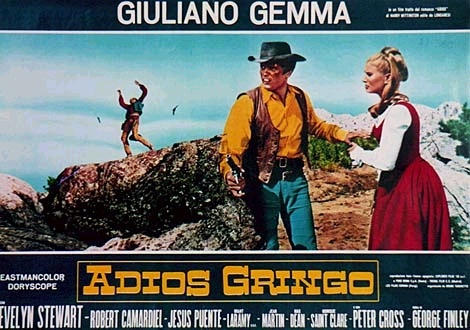ADIOS GRINGO
Dir: Giorgio Stegani. Cast: Giuliano Gemma, Ida Galli (Evelyn Stewart), Pierre Cressoy (Peter Cross), Roberto Camardiel, Massimo Righi (Max Dean), Jesus Puente, Nello Pazzafini. Music: Benedetto Chiglia
The fourth Gemma western released in 1965, and the fourth box-office succes, Adios Gringo, was based on a novel by American writer of pulp fiction Henry Whittington. While several spaghetti westerns used elements from literary works by Homer (Una Pistola per Ringo), Shakespeare (Quella Sporca storia nel West/Johnny Hamlet) or Jules Verne (Per Pochi Dollari Ancora/Fort Yuma gold), apart from this film only a handful were genuine adaptions of literary fiction about the Far west, among them: Tonino Valerri’s I Giorni dell’Ira/Days of Anger was based upon a German novel by Ron Barker, Der Tod ritt Dienstags, El Precio de un Hombre/The Bounty Killer was based on a novel by Marvin H. Albert and the script for Fulci’s I Quattro dell’Apocalysse originated in two short stories by American Francis Brett Harte.
In the first moments of the movie, Gemma buys cattle from an acquantaince, but when he brings his livestock into town he is accused of being a thief by the real owner and is forced to kill the man in self defence. The town’s people try to hang him but he escapes, promising to return and prove his innocence. On the run he saves the life of a woman (Galli) who was raped after a stagecoach robbery and left behind, tied naked to four poles, to die from thirst and sun-glare. Although the actual rape is not shown and Galli’s naked body is hidden from view by Gemma’s stature when he approaches her, the sequence is quite nasty. Violence towards women seems to be a recurring theme in those early spaghettis, as some discussions on the forum have pointed out. But while in some other films the suggestion is made that women might like these things, here rape and torture are used to underline how bad the villains are, as if director Stegani wishes to undermine the pseudo-christian symbolism of the virgin/harlot mottto, used by some of his colleagues.
Adios Gringo was Stegani’s first western as a director, after having worked as assistent-director for Giorgio Ferroni’s Un Dollaro Bucato. No wonder for a film based on an American novel, Adios Gringo is rather traditional, even though the violence is a bit more graphic here than in Ferroni’s movie or Tessari’s Ringo movies. Gemma shows little of the cynical attitude the Italian western would be identified with, instead he is a very noble guy, who is forced by circumstances to use his fighting and shooting skills against the forces of evil. What might have appealed to Stegani (and Italian moviegoeers) in Whittington’s story, is the fact that one of the main villains is the son of the mightiest man in the region (Cressoy), who’ll do anything to protect the perverted young man. The pattern of the brave but simple country man taking on one or more corrupt dignitaries, is one of the most popular with the spaghetti western genre. What we have here, is a genre movie looking for his own style, with distinguishing Italian genre marks cautiosly shining through. While most actors still use pseudo-American names, Giuliano Gemma uses his birthname for the first time here, dropping the Americanized ‘Montgomery Wood’.
This is not one of the great spaghetti westerns, but it’s an interesting early genre entry and a pleasant pasttime. The part of the farmer who must clear his blackened name, fits Gemma like a glove and his main opponent Righi is excellent as the perverted son, a piece of vermin looking as trustworthy as a ferret who’s about to thrust his teeth in a rabbit’s neck. There’s a good Roberto Camardiel too, cast against type as a wise doctor istead of the usual comical sidekick. Benedetto Chiglia’s score is more than adequate, except for a particularly corny theme song.
Reviewed DVD: I watched the Italian Shendene DVD. Although not enhanced for widescreen TVs, the 2,35:1 image is very good. But there’s only Italian audio (and it sounds a bit hollow too) so the DVD won’t be of much use to those who don’t understand Gemma’s native tongue …
For more info visit:
Database page: Adios Gringo - The Spaghetti Western Database
- 5
- 4
- 3
- 2
- 1
0 voters



